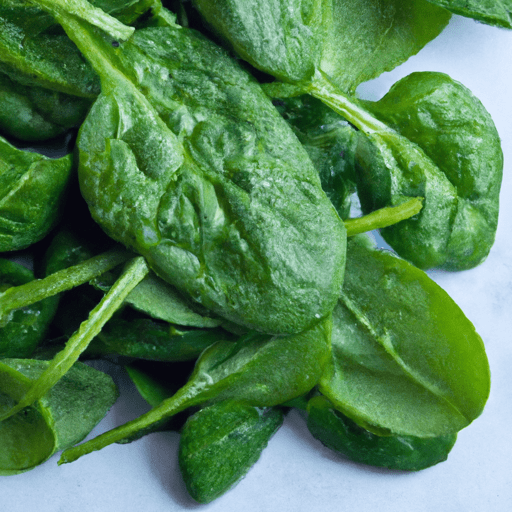Discovering the Versatility of Baby Spinach Leaves
When it comes to nutrient-packed leafy greens, one cannot ignore the vibrant and tender baby spinach leaves. These petite greens may be small in size, but don’t let that fool you - they offer big flavors and a multitude of culinary possibilities. Whether you’re a health-conscious foodie or just looking to enhance the nutritional value of your meals, baby spinach leaves are a fantastic addition to your cooking repertoire.
Taste and Texture
Baby spinach leaves have a delightful and delicate flavor profile with a hint of earthiness. This leafy green boasts a mild, slightly sweet taste that pairs well with a wide array of ingredients. Additionally, the tender nature of these leaves provides a pleasant, almost buttery texture, making them ideal for both raw and cooked dishes.
Common Uses in Cooking
One of the greatest assets of baby spinach leaves is their versatility. These vibrant greens can be seamlessly incorporated into a variety of dishes, adding not only a pop of vivid color but also a healthy boost of nutrients. Here are some popular ways to make the most of baby spinach leaves:
Salads and Sandwiches
Baby spinach leaves make an excellent foundation for salads, offering a refreshing and nutritious base. Toss them together with other vibrant veggies, gourmet cheese, toasted nuts, and your favorite dressing for a satisfying meal. Alternatively, use them as a lettuce replacement in sandwiches, wraps, and burgers to add a burst of freshness.
Sauteed and Stir-Fried
When lightly cooked, baby spinach leaves wilt down and become incredibly tender. Sauteeing them with a little bit of olive oil, garlic, and a sprinkle of salt and pepper creates a simple and mouthwatering side dish. Incorporate them into stir-fries for a nutritious addition that adds both color and texture.
Smoothies and Juices
Boost your morning routine by adding a handful of baby spinach leaves to your smoothies or homemade juices. Their mild taste blends seamlessly with fruits, giving you an easy way to sneak in some extra nutrients.
Pasta and Pizza
Elevate your pasta and pizza dishes by tossing in a handful or two of baby spinach leaves. Whether wilted into a creamy pasta sauce or used as a fresh topping on a cheesy pizza, the spinach adds both flavor and a vibrant green touch.
Nutritional Value
Aside from their versatility in the kitchen, baby spinach leaves are a nutritional powerhouse. Packed with essential vitamins, minerals, and antioxidants, they offer numerous health benefits. Here are some key nutrients found in baby spinach leaves:
- Vitamin A: Promotes healthy vision, skin, and immune function.
- Vitamin C: Boosts immunity and collagen production.
- Iron: Supports oxygen transportation and energy production.
- Calcium: Essential for strong bones and teeth.
- Folate: Important for cell growth and development, particularly during early pregnancy.
Moreover, baby spinach leaves are low in calories and high in dietary fiber, making them an excellent choice for weight management and digestive health.
Interesting Facts and History
Spinach has a rich history that dates back centuries. While the exact origins are debated, it is thought to have originated in ancient Persia (modern-day Iran). From there, spinach made its way to China, Europe, and eventually fell into culinary favor worldwide.
The term “baby spinach” refers to the tender leaves of the spinach plant, which are harvested early in their growth. This early harvest ensures a more delicate texture and milder flavor compared to mature spinach leaves. Baby spinach gained popularity in the United States during the late 20th century and has since become a staple in many households.
Conclusion
Baby spinach leaves are an incredibly versatile and nutritious ingredient that deserves a place in your kitchen. Whether tossed in salads, sauteed as a side dish, or added to smoothies and main courses, these petite greens not only enhance the taste of your dishes but also provide a significant health boost. So why not grab a bag of baby spinach leaves on your next trip to the grocery store and unlock a world of culinary possibilities? Your taste buds and your body will thank you!
Baby Spinach Leaves
Origin: Baby spinach leaves, also known as spinachette or tender spinach, come from the spinach plant, scientifically known as Spinacia oleracea. Spinach is native to Persia (modern-day Iran) and was introduced to Europe in the 12th century. It is now cultivated worldwide.
Common Uses: Baby spinach leaves are versatile and can be used in various culinary applications. They are commonly used raw in salads, sandwiches, and wraps. They can also be cooked by wilting or sautéing them, added to soups, stews, or as a side dish. Baby spinach leaves are a popular choice for green smoothies and juices due to their mild flavor.
Nutritional Benefits: Baby spinach leaves are highly nutritious and an excellent source of vitamins and minerals. They are particularly rich in vitamin K, vitamin A, vitamin C, folate, potassium, and magnesium. They also contain dietary fiber and antioxidants like lutein and zeaxanthin. Baby spinach leaves are low in calories and fat, making them a nutritious choice for those looking to maintain a healthy diet.
Unique Properties: Baby spinach leaves are known for their delicate and tender texture, which differentiates them from mature spinach leaves. They have a mild, slightly sweet flavor compared to the stronger taste of mature spinach. Baby spinach leaves are often preferred for salads and raw preparations due to their more pleasant texture and flavor.
Historical Significance: Spinach has a long history and has been cultivated since ancient times. It gained popularity in various civilizations, including Persian, Arab, and Mediterranean cultures. Spinach is famously associated with the fictional character Popeye the Sailor, who gained strength from eating spinach in the early 20th-century comic strips and later cartoons and movies. This association contributed to the widespread popularity of spinach and its reputation as a healthy and nutritious vegetable.




Use the share button below if you liked it.
It makes me smile, when I see it.